Controversial Garden Street Hotel in Santa Barbara’s Funk Zone Approved in 4-2 Vote
Planning Commission Moves Forward with 250-Room Hotel; Developers to Give $500,000 to Housing Fund
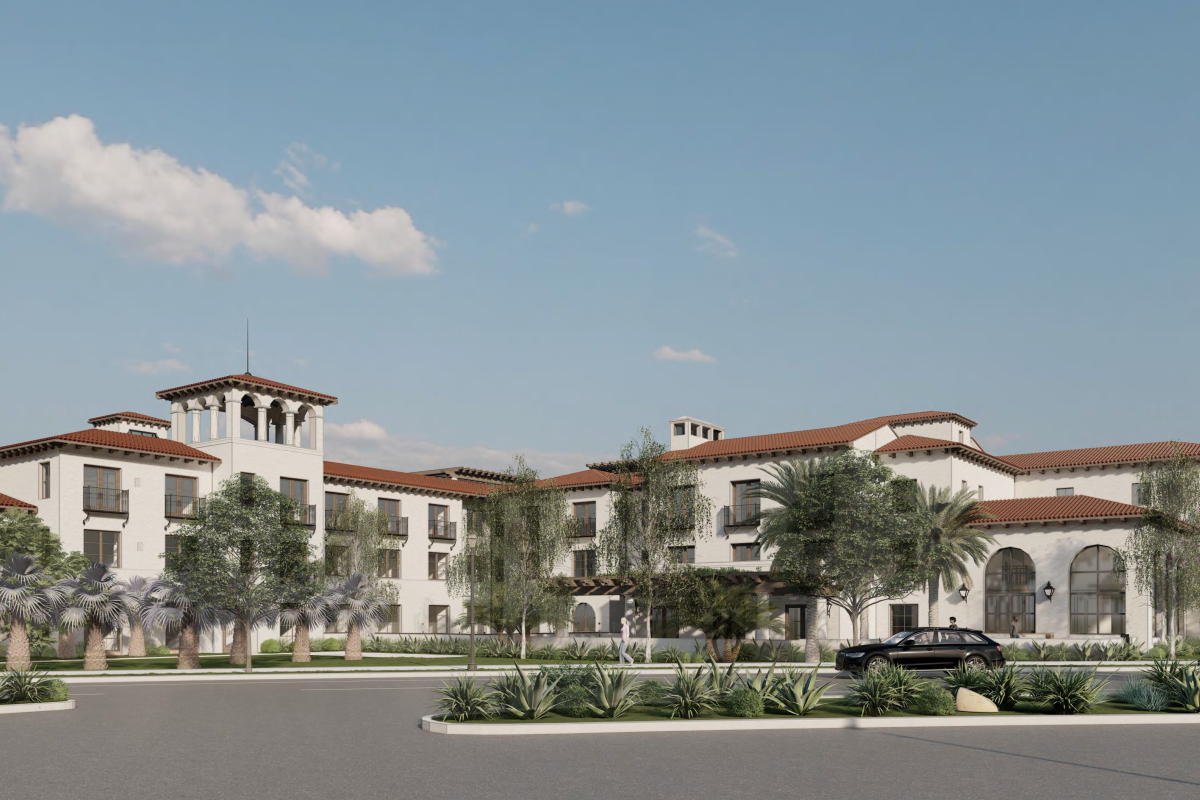
The proposal to build a 250-room hotel on the corner of Garden and East Yanonali streets earned the approval of the City of Santa Barbara’s Planning Commission in a 4-2 vote after a tense four-hour hearing on Thursday, February 29.
Much of the debate surrounded housing impacts and the terms of the development, which were first put in place back in 1983 when the City of Santa Barbara struck a deal with property owner Bill Wright. The deal gave him the right to build a hotel across the six lots if he allowed the city to build extensions through his property to connect Garden Street to Cabrillo Boulevard.
While the city completed construction of the extensions in 1997, a change that opened up the space for the Funk Zone, the Wright family did not submit an application until 2019 — nearly four decades after the original Specific Plan agreement.
The project, known as the Garden Street Hotel, has been highly criticized by community members who feel that the city should not allow more hotel development given the local housing crisis, and this was the third time the commission has reviewed the hotel since April 2023. Since then, the developer has added six affordable units to help mitigate housing impacts.
But despite the community opposition, city planning staff recommended that the commission approve the hotel, given that it meets all objective standards and has met all the demands laid out in the 1983 Specific Plan.
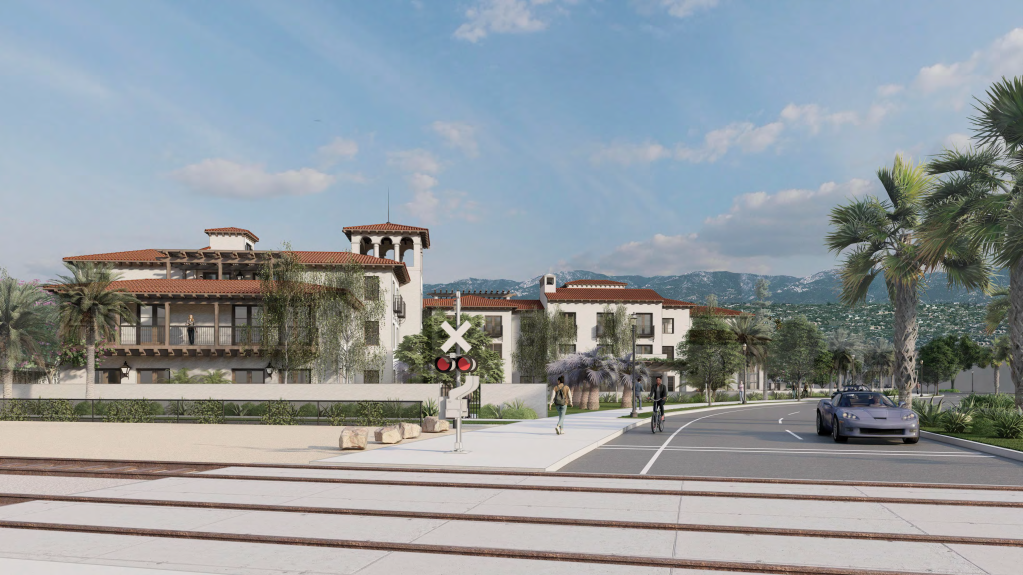
Planning Commission Chair John Baucke, who has voted multiple times against the project, said he could not support the proposal because in his opinion the six units offered did not meet the Specific Plan provision of “minimizing the adverse impacts on the city’s housing supply.”
He challenged the developer’s finding that for 60 new employees, the project would have an estimated housing impact of only 11 units. In order to get to this number, the developer assumed that 70 percent of the new workers would not need to live in town, a fact that several commissioners contested. He then challenged the fact that they refused to offer 11 units, instead sticking to a maximum of six units total.
“The appropriate number to mitigate in this case is 25,” Baucke said. “It’s not 11 and not anything short of that.”
During public comment, community members and representatives from local organizations echoed previous concerns over housing, environmental, and overall impacts of what would be the second-largest hotel in Santa Barbara — behind only the 360-room Hilton Santa Barbara Beachfront Resort less than a mile up Cabrillo Boulevard. Opponents called the proposed hotel a “cookie-cutter monstrosity” that hasn’t changed despite multiple comments from the commission.
“The Garden Street Hotel, as it is proposed today, looms over the horizon like an impending storm threatening to disrupt the very fabric of our community without offering any semblance of return or benefit to this community,” said Brittany Zajic, chair of the nonprofit Keep the Funk S.B.
She urged the commission to not rush to a final decision and to allow the public more time to provide input on the project. The fact that the developers were so eager to push the project though, she said, should be a red flag for the city.
“There’s a weird, palpable sense of false urgency to make a decision about what is going to be a hundred-year-long project without proper due diligence and considerations — almost as if they don’t have to live with the outcome but have everything to gain from it.”

Gareth Kelly, a Santa Barbara–based filmmaker who helped lead the charge in the public battle against a 66-room hotel slated to take the place of the locally beloved Press Room pub, spoke in similar opposition to the Garden Street Hotel. While the Press Room’s fated demolition was sealed by the City Council in January, Kelly hoped that the public outcry would at least help ring the alarm to city leadership that Santa Barbara residents did not want another hotel.
“But little has changed, and voices of this community are being drowned out by the gluttonous, profit-driven, develop-at-all-costs mentality,” Kelly said. “And so I find myself here, yet again, opposing yet another hotel our community simply does not need, does not want, and a project that threatens to drive a stake through the beating heart of an area we know and love as the Funk Zone.”
He said that approval of the Garden Street Hotel was the “antithesis of sound community planning” and pleaded with the commissioners to “do the right thing” by denying the project.
“You have the power right here today. You can choose to do what is moral, what’s right, and what’s ethical, and what is in the best interests of this community and the city,” Kelly said. “Simply agreeing with city staff and bending over to accommodate the insatiable wishes of yet another affluent developer while the community at large screams at you how strongly they oppose this project is not sound community planning nor is it morally correct.”

Developer Shaun Gilbert, who has represented the Wright family throughout the review process, refused to budge on the commission’s requests for more housing. For his team at Newport Harbor–based Dauntless Development, he said, it would be better for the city to move forward and accept that “this isn’t a housing project.”
“Our frustration is that we just keep getting dragged down this road,” Gilbert said. “Whether or not people like it, or if it fits in, it is what it is.”
He addressed concerns of the public, saying he felt that those who oppose the project will never accept a hotel.
“We are gonna agree to disagree on that, and that’s it, and we have to all move on,” Gilbert said.
“They’re allowed to have their opinion, and so are we; they’re allowed to have their opinion on housing, and we’re allowed to build a hotel.”
But in order to win the approval of the commission, the project developers did agree on a few new terms that would help prove the community benefit of the project. After much back and forth, Gilbert agreed to offer $500,000 to the city’s Local Housing Trust Fund; to allow local art to be displayed in the interior of the hotel; and to agree to mitigation and monitoring conditions to ensure there wouldn’t be any unforeseen environmental issues.
Commissioner Devon Wardlow — the Planning Commission’s most vocal opponent to this project — gave the developers credit for offering the half a million dollars, though she said that six units and a contribution to the housing fund was still not enough to address the potential housing impacts.
“Back 40 years ago, the council understood that housing was an issue,” Wardlow said. “And today, it’s not fair to sit up here and say that the housing crisis is not a dire situation.”
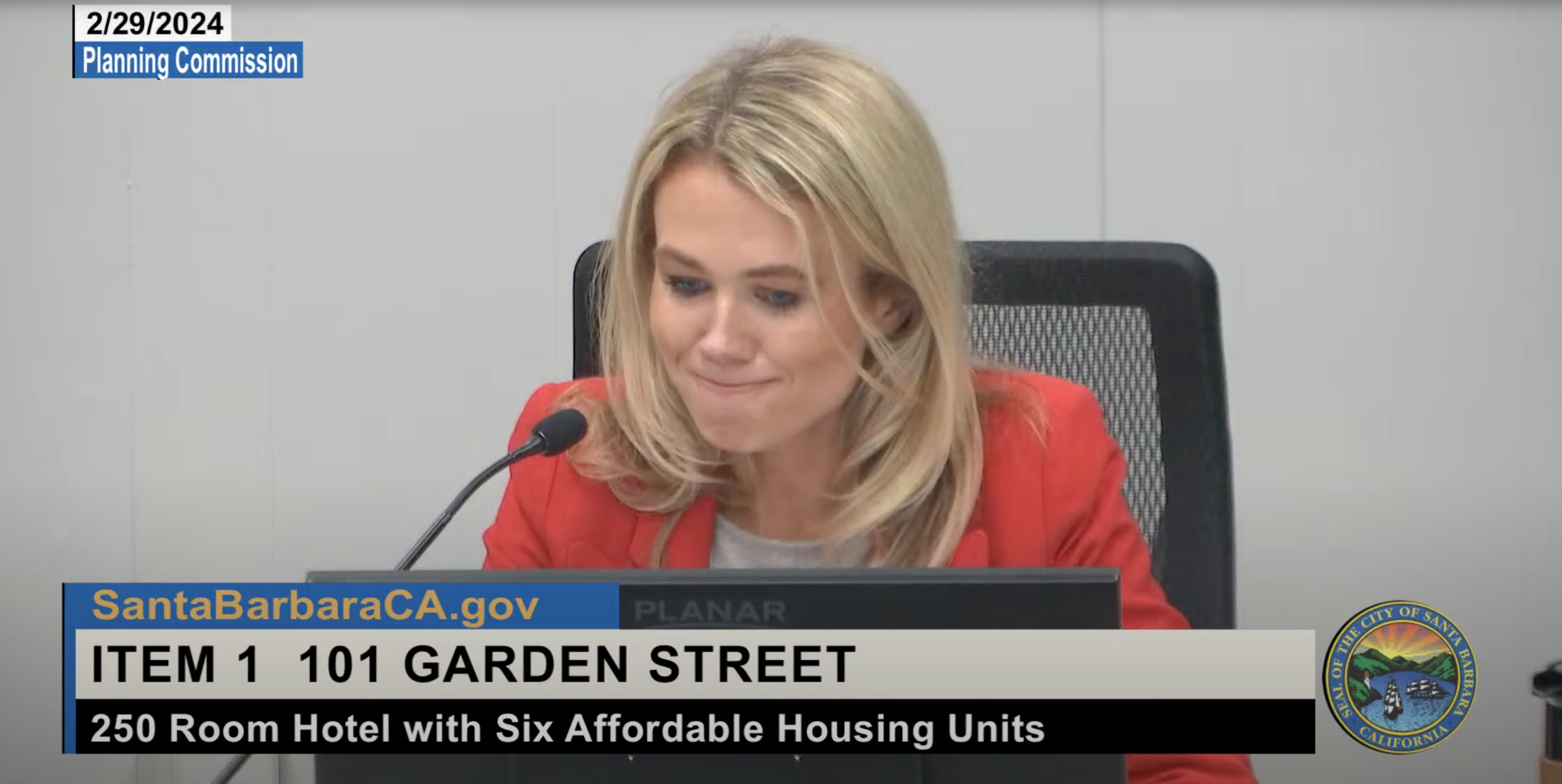
Other commissioners felt that the Specific Plan only called for the developers to “minimize” impacts, not fully eliminate them. And since the city’s Housing Authority could likely leverage that donation tenfold, the money could turn into as much as $5 million toward a truly affordable project.
In the end, the commission voted 4-2 to move forward with the project and grant a California Environmental Quality Act exemption, which would preclude the project from any further environmental review. In both votes, Chair Baucke and Vice-Chair Wardlow voted in opposition, with Wardlow saying “our ethical commitment to the Wright family does not outweigh our ethical commitment to the community.”
Commissioner Brian Barnwell, who was voting on the project for the first time after rejoining the Planning Commission in December 2023 (Barnwell served previously as both a city councilmember and a planning commissioner from 1998-2007), said that he understood the concerns over housing, but that he could not vote against the project and that it was unlikely that housing would ever be built on the proposed site. Even if a developer were willing to build a residential development, he added, the city’s zoning code would only allow a maximum of 90-100 units, almost all of which would be offered at market rate.
“They won’t go to Santa Barbara people at all,” Barnwell said, “and they certainly won’t hit the target audience we want to hit, which is the affordability segment of the community.”
Following the meeting, attorney Marc Chytilo, who represents Keep the Funk S.B., said that while the commission recognized many of the problems raised by the community, “only commissioners Baucke and Wardlow stood up for Santa Barbara and the Funk Zone.”
“The City is relying on decades-old environmental documents and ignoring changed conditions and much greater project impacts than previously studied,” he said.

The project site, which is in a flood zone and in a former industrial district, is “contaminated with hazardous materials, and shallow groundwater just below the surface,” Chytilo said, and its proposed 238-space underground garage would be vulnerable to flooding and sea-level rise impacts once built.
“The decision needs to be appealed to prevent irreversible adverse impacts to the community,” Chytilo said. “This is the largest hotel development proposed in Santa Barbara in 30 years and is on a highly vulnerable site. The project needs a full environmental review to inform the public of impacts and enable decision maker due diligence to determine if it makes sense to build this project on such a contaminated site.”
There is a 10-day window for an appeal of the Planning Commission decision. If appealed, the project would then go before the City Council.
Premier Events
Sun, Apr 28
6:00 PM
Santa Barbara
AHA! Presents: Sing It Out!
Thu, May 02
5:00 PM
Santa Barbara
Things with Wings at Art & Soul
Sat, May 04
10:00 AM
Lompoc
RocketTown Comic Con 2024
Sat, Apr 27
11:00 AM
Santa Barbara
Santa Barbara Plant Fest
Sat, Apr 27
3:30 PM
Santa Barbara
Santa Barbara Trapeze Co and Unity Shoppe Spring Food Drive
Sat, Apr 27
8:00 PM
Santa Barbara
Beau James Wilding Band Live
Sun, Apr 28
11:00 AM
Santa Barbara
Santa Barbara Earth Day Festival 2024
Wed, May 01
7:30 PM
Santa Barbara
American Theatre Guild Presents “Come From Away”
Thu, May 02
5:00 PM
Santa Barbara
100th Birthday Tribute for James Galanos
Thu, May 02
5:00 PM
Santa Barbara
Meet the Creator of The Caregiver Oracle Deck
Fri, May 03
4:00 PM
Santa Barbara
Santa Barbara Fair+Expo “Double Thrill Double Fun”
Fri, May 03
8:00 PM
Santa barbara
Performance by Marca MP
Sat, May 04
10:00 AM
Solvang
Touch A Truck
Sun, Apr 28 6:00 PM
Santa Barbara
AHA! Presents: Sing It Out!
Thu, May 02 5:00 PM
Santa Barbara
Things with Wings at Art & Soul
Sat, May 04 10:00 AM
Lompoc
RocketTown Comic Con 2024
Sat, Apr 27 11:00 AM
Santa Barbara
Santa Barbara Plant Fest
Sat, Apr 27 3:30 PM
Santa Barbara
Santa Barbara Trapeze Co and Unity Shoppe Spring Food Drive
Sat, Apr 27 8:00 PM
Santa Barbara
Beau James Wilding Band Live
Sun, Apr 28 11:00 AM
Santa Barbara
Santa Barbara Earth Day Festival 2024
Wed, May 01 7:30 PM
Santa Barbara
American Theatre Guild Presents “Come From Away”
Thu, May 02 5:00 PM
Santa Barbara
100th Birthday Tribute for James Galanos
Thu, May 02 5:00 PM
Santa Barbara
Meet the Creator of The Caregiver Oracle Deck
Fri, May 03 4:00 PM
Santa Barbara
Santa Barbara Fair+Expo “Double Thrill Double Fun”
Fri, May 03 8:00 PM
Santa barbara
Performance by Marca MP
Sat, May 04 10:00 AM
Solvang



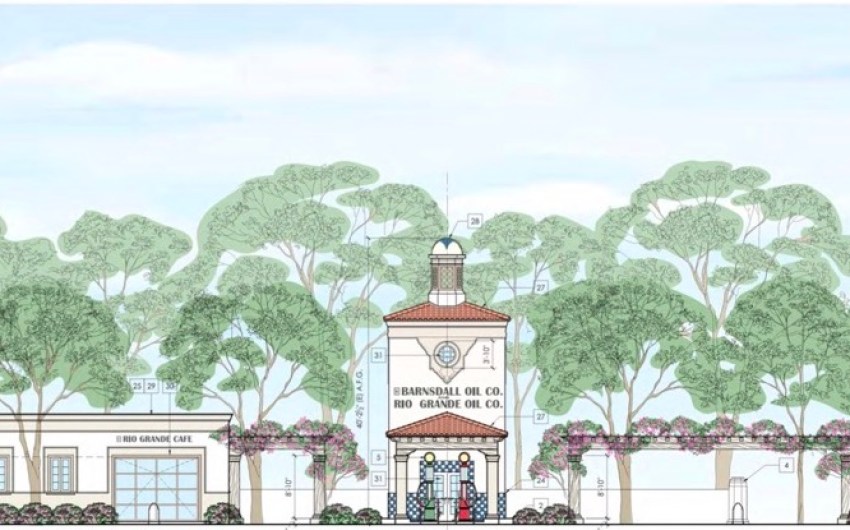
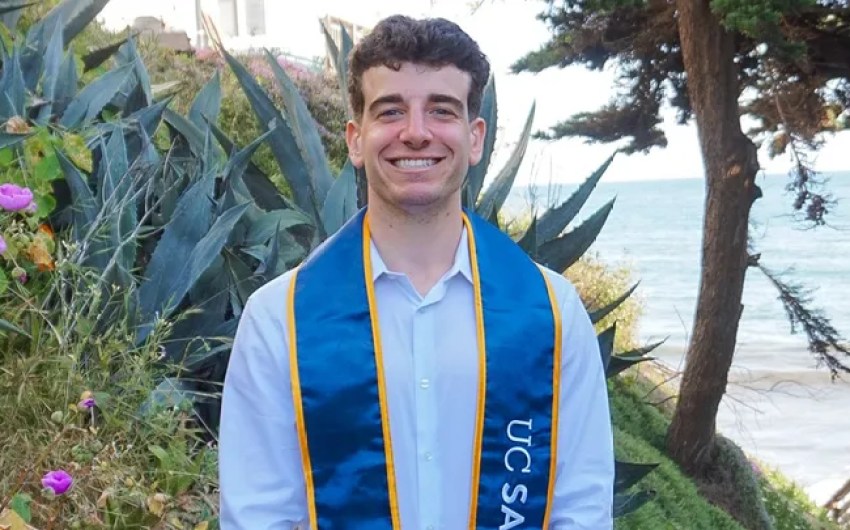

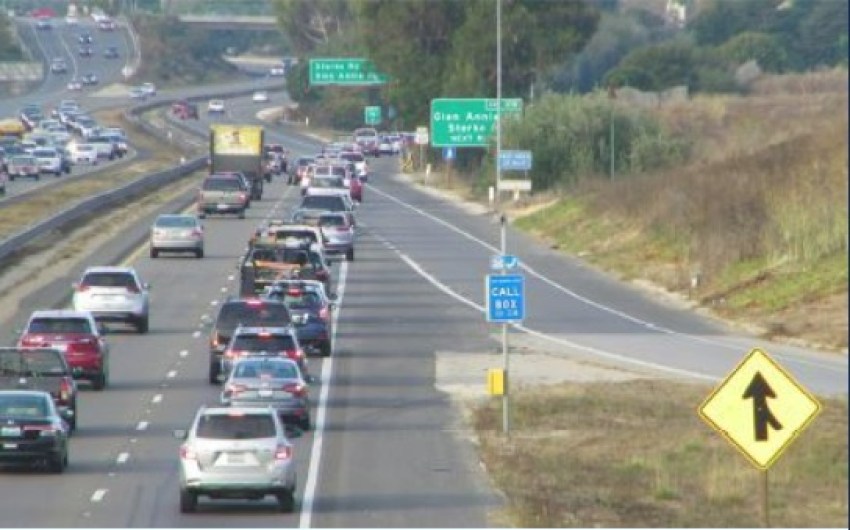

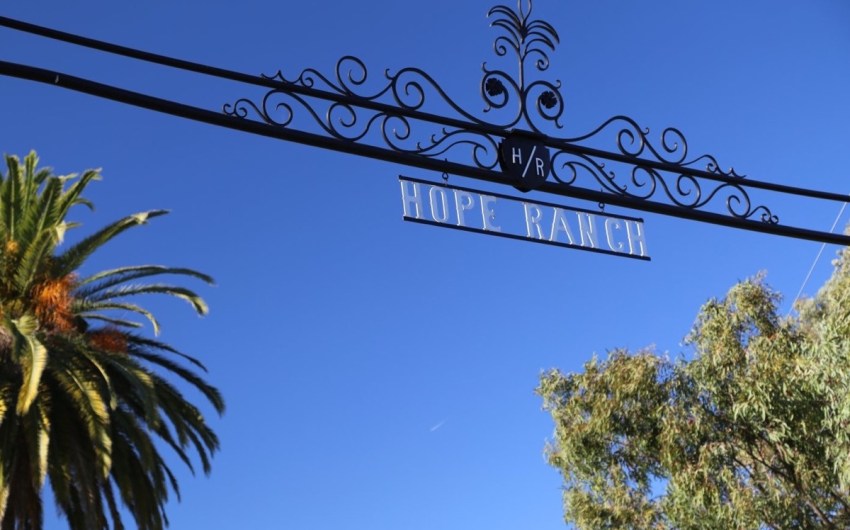


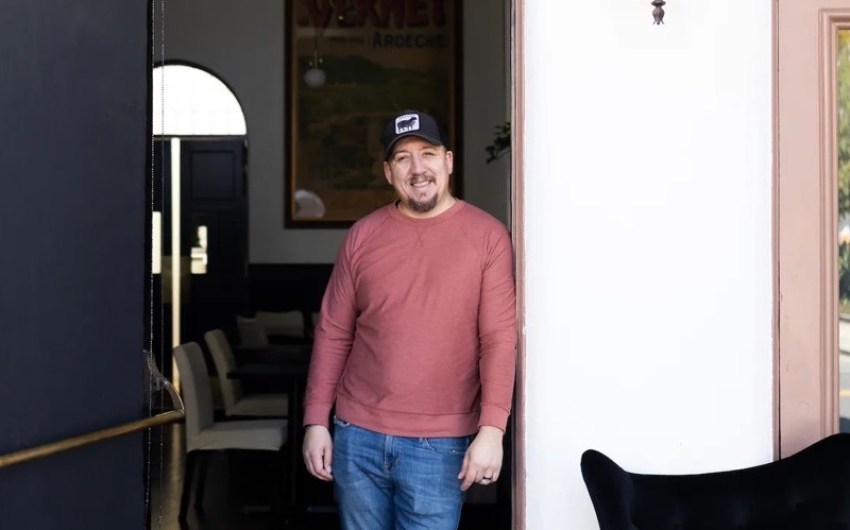













You must be logged in to post a comment.